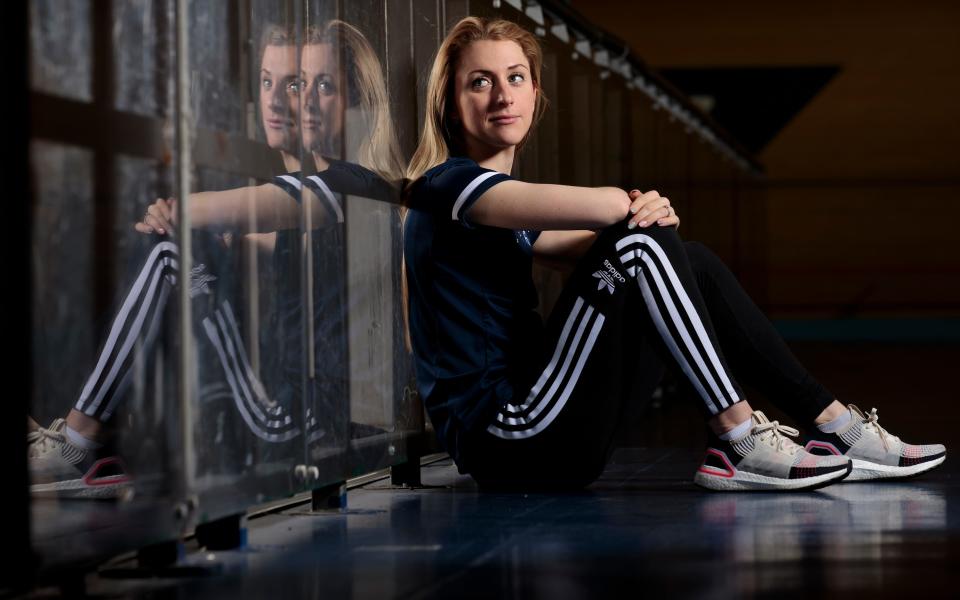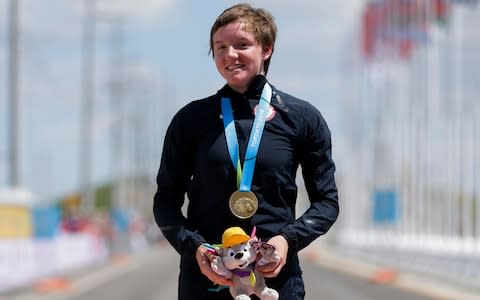Exclusive interview: Laura Kenny hopes cycling can learn from Kelly Catlin’s tragic death

The smile which has been a near-permanent fixture on Laura Kenny’s face during the half-hour or so in which we have been talking disappears abruptly when the conversation turns to Kelly Catlin, the American rider who tragically committed suicide 10 days ago at the age of just 23.
“I just hope someone at British Cycling saw that,” Kenny says, her voice trailing off sadly. “I’m not saying there is anything wrong with British Cycling. But did USA Cycling even know how she was feeling?
“Were there any warning signs that they missed? Because I would hate to think that there was someone on our squad who feels that way; who feels they have no one to turn to …”
Kenny’s concerns reflect the profound sense of shock which has gripped the sport in the past week.
How could this brilliant young woman, who was studying computational and mathematical engineering at Stanford while hoovering up medals on the track, have felt so low that she was prepared to take her own life? Could anyone have intervened? Should anyone have intervened?
Catlin’s parents’ subsequent admission that their daughter’s suicide was the second attempt she had made on her own life only made those questions louder. Her father, in an interview with VeloNews, said that in his opinion Catlin had been the victim of a “perfect storm” of depression, overtraining and concussive symptoms following crashes last autumn.

This should ring alarm bells at national governing bodies in this country where the pressure to perform – especially with millions of pounds of public funding behind you – has led to unprecedented success, but also to numerous examples of mental-health crises. Crashes and concussion in sports such as cycling add another layer of danger to the mix.
British Cycling takes this area seriously. It currently employs two sports psychologists. Indeed, Elinor Barker credits one of them, Rich Hampson, with getting her career back on track after she came close to quitting six months ago. But it is an area it is understood to be reviewing.
Kenny admits Catlin’s death has made her question the intensity of her relationship with her sport.
“It has really hit me,” she says, sitting in the track centre in Manchester. “We came up against her a lot. She was obviously there in Rio in the team pursuit final. I said to Jas [husband Jason Kenny], ‘It’s sad she felt she didn’t have anyone to speak to … it’s just riding your bike’. Jas said, ‘Well you don’t see it as just riding your bike’. And it’s true. I do see it as more than that. Because you do give 24/7 to it. We invest so much.”
At the age of 26, Kenny says she feels fortunate that she is in a stable place in her life. As Britain’s most successful female Olympian, with four gold medals to her name garnered across two Games, and with Tokyo looming on the horizon, there is naturally a certain amount of pressure on her to live up to her reputation.
But having given birth to a son, Albie, in the summer of 2017, she feels she has a good perspective on life.
She cites her reaction to her decision to pull out of competing in the omnium at last month’s Track Cycling World Championships in Poland. “As much as I was heartbroken,” she says, “and as much as for the first couple of hours afterwards I was sat there like ‘this is awful’ … ultimately, Albie’s there. I flew home with him. And all of a sudden I didn’t feel sad any more. I don’t think it’s a bad thing.”

Kenny checks herself. She is conscious that might make it sound as if she does not care as intensely as she once did.
“I don’t want people to read this and think ‘Oh she doesn’t care’,” she says. “Because I do. But I’d say my priorities have changed in the sense that when I go home I’m now fully Albie’s mum. I am his world, you know? For me that’s so important.
“But I do want to go to another Olympics. I’m not going to sit here and kid myself that I don’t want to go to an Olympics and be in with a chance of winning more gold medals. Because I do. I’m not leaving Albie at home for no reason when I go out training. Like I said earlier, I want to compete. I do still have that fire in me.”
Of more concern to Kenny was the reason she had to pull out of that omnium in Pruszkow; the victim of a mysterious illness which crept up on her at the last minute and which meant she was not at her best in the team pursuit final the night before, the British quartet losing out to Australia by two tenths of a second.
“It’s annoying because I never really felt anything, if you know what I mean,” she recalls. “I just felt really bad. I couldn’t give anything at all. I was supposed to be doing two two-lap turns.
“And in the final, I just went lap and a half, lap and a half. I was so far off my numbers in the dress rehearsal which we did here.
“I hope it was just an illness. And it wasn’t the fact … cos my dad keeps saying ‘Oh, it could be the change in circumstances [motherhood]’.”

Kenny thinks not. She points out that she has taken Albie to numerous track meetings since her return to elite sport last year and has never experienced anything similar. She has a babysitter “24 hours a day” when she is competing. Indeed, at the recent Track World Cup event in Canada, she felt the best she has felt since her comeback. “Like I say, my numbers were good in training. I hope it was just a one-off.”
Next up is a new event in the Six Day series in Manchester, starting this week. Kenny says that after a week’s holiday post-Poland, she is looking forward to getting back in the saddle. For once the pressures of competing will not be overly intense, with Six Day events famously laid-back. “Although there are UCI ranking points attached to it,” she adds. “So, it’s going to be tough racing. It could get competitive with all of the GB girls racing against each other.”
Kenny pauses. “I still want to win. I still have that burning desire. I just leave it on the track. When I get home I’m Albie’s mum. And I think that helps me, too, because it does just make me realise as much as this is my life, it is just riding my bike.”
Tickets for Phynova Six Day Manchester can be bought at ticketmaster.co.uk/sixdaymanchester.

 Yahoo News
Yahoo News 